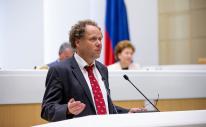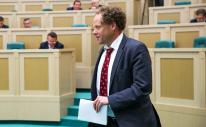Expert opinion: a Russian entrepreneur with German roots
29 June 2018 News from the Company
Excerpt from the speech of Stefan Duerr, President of EkoNiva Group, at the Federation Council on 20th June, 2018
 Stefan Dürr
Stefan DürrOn agricultural policy
It was challenging to work in the 90s… In the 2000s, the Russian government started implementing efficient agricultural policy aimed at innovative development and economic growth. Since then, we have achieved food security in many areas and established efficient enterprises, a lot of which demonstrate a considerable export potential. Currently, the President’s task for export expansion is absolutely achievable!
On rural areas
In the north of Norway, rural areas are prosperous and successful because farming is one of the key priorities in the country, while in the north of Sweden – just across the border – there are no villages, only boundless tundra, because there is virtually no agriculture. We have managed to preserve villages in a lot of regions of Russia. Some people say, ‘What is the use of developing agriculture in Kostroma or Arkhangelsk oblasts?’ I am convinced that every region must engage in farming because it is the only way to preserve Russian villages. Even though it is expensive and not always efficient, it is very important for the country and its rural areas.
On laws
Russia needs a new Law on pedigree cattle breeding since we cannot keep pace with our colleagues from abroad unless we have a modern efficient law. Agricultural producers are also impatient for the new Law on organic farming to come in force. Besides, it is extremely important to introduce Amendments to the Law on land regarding vacant land. Very often, a piece of private land, which is not put to any use, overgrows with trees. When at last the land gets into the hands of a conscientious farmer who wants to work on it, the government has to provide subsidies to clear the land and make it suitable for agriculture again. This leads to the thought: why let those trees grow, in the first place? Moreover, some negligent land owners formally resell the land three years after the purchase to avoid confiscation. We need to eliminate this deficiency in the law. Agricultural land must belong to those who want to work on it.
 Stefan Dürr
Stefan DürrOn balanced approach
We will probably not be able to work efficiently without imported machinery, at least for some years to come. I fully understand that we need to take counter measures in response to the sanctions. However, we can do harm to our agriculture by introducing strict limitations on the import of machinery and technologies. Therefore, it is important to assess the possible effect on our farmers when making decision on the import of farming machines and technological systems.
On young specialists
If we want young people to work in agriculture, we must provide them with the same working conditions as in the city. A young specialist working at a farming operation must have the same number of days off, an annual leave and the same living conditions as in the city. There is a myth that nobody wants to work in agriculture. It is not true! Within the past 4-5 years, the image of agriculture has changed for the better. We can see a lot of young enthusiasts who are willing to study agriculture and work at farming enterprises.
On education
Sometimes, representatives of agricultural universities tell me that they are going to visit our enterprise to learn about new farming technologies. It is strange to hear that: as a rule, universities are ahead of farmers in the areas of science and technologies. Unfortunately, a lot of universities cannot be ahead because they do have the necessary support from the government. We have arranged agricultural classes in some regions so that children could learn about agriculture from an early age. It is essential to support colleges and institutions of higher education. If we want to be a country with advanced agriculture, then Moscow Agricutltural Academy named after K. A. Timiryazev must be as good as Moscow State Technical University n. a. N. E. Bauman, and Voronezh State Agricultural University — as good as Moscow Institute of Physics and Technology. It is the only possible way forward.
On fair competition
Within the past few years, we have built а large number of dairies; we receive subsidies and soft loans. However, all these efforts might prove to be in vain if we do not solve the problem of adulteration of dairy products. We can compete with the USA, new Zealand, even Belarus if we are talking about true dairy products. However, there is no competing with palm oil. If this situation is not solved in the nearest future, EkoNiva will cope with it, but many farming operations won’t. It means that next year, the number of dairy cows in the country will significantly decrease. In order to avoid this, we hope for the strictest measures against adulteration.
Translation from Russian
This article was also published in the latest issue (No. 60) of Ekoniva News - News and Analysis on Agriculture in Russia and the EkoNiva Group:
